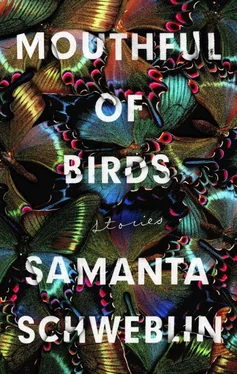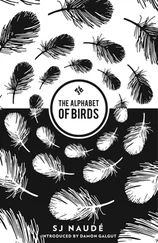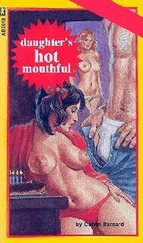“I know it’s strange,” he clarified for Mrs. Linn, “but I’m sure he was only looking at the yellow ones. Yellow like in my dream.”
He was afraid that among so many patients Mrs. Linn would forget the smallest details, and maybe it was there, in the yellow, where the important point lay. But Mrs. Linn’s fingers moved quickly up his back, and he understood how familiar she was with this kind of story, and he trusted that he had to go ahead with his own, without so many explanations.
“My father got up and left the kitchen,” he went on, “and it was the way he did it, a little stiffer than usual, that put me on alert. ‘Where are you going?’ my mother asked him. ‘You’re leaving without the shopping list.’ It was fairly violent, the way she stuffed the paper into his fist, like cramming an oversize letter into the mouth of a too-soft mailbox. But my mother knew what she was doing: with an order in his hands, my father would have to return.”
“Inhale and exhale deeply,” Mrs. Linn reminded him. “If you like, you can close your eyes.”
Sometimes he raised his head from the opening in the massage table to add a detail or size up Mrs. Linn’s eyes. But she dug her elbow into some strategic point of his body and put him right back in his place. Her elbows, her fists and knees approached, always shining and moist, avid. She shook the tubes of lotion before opening and squeezing them. She said it was good for the lotion to feel cold on first contact with the body, because it stimulated the epidermis and activated the muscles.
“I’m afraid,” he said in the ninth session, “afraid of a lot of things.”
He was immediately ashamed. He’d spoken without thinking; maybe the contact with the massage table put him too much at ease.
“Relax your arms,” said Mrs. Linn.
Maybe something had softened more than it should, and now there were things he could no longer control.
“Open your fists.”
Mrs. Linn poured more oil on her hands and extended her fingers several times, as if doing some sort of stretching exercise.
He felt more docile than usual; he was on the verge of tears, and it was a very embarrassing thing. But he took a deep breath and steeled himself to go on.
His father came back at midnight, almost twelve hours later and in the pouring rain, carrying the purchases in two large, drenched bags. In his last years of grade school, the father’s looming disappearances tormented him more and more, and not only because of the pain of feeling abandoned. It was resentment. Resentment that inflated in his chest and was caused by his father, so clumsy and weak and unable to leave for good. It was a painful ball of air that he carried with him, always with his mouth closed. Because if the father ever did manage to leave, that ball of air would be all that remained of him, and he wasn’t willing to let go of it so easily.
In the tenth session, Mrs. Linn asked about the dream again. He still had it, although the treatment was relieving the symptoms. He and his father were still a yellow animal, a single animal looking at itself in the mirror.
In the twelfth session he again felt the need to make some clarifications. His parents didn’t get along badly, that didn’t seem to be the problem, and neither were there financial problems. Sometimes these explanations were for himself, but he still made them out loud in order to include Mrs. Linn. Whatever it was that happened there on the massage table, it was a joint task. He said what he had to say, and, in exchange, Mrs. Linn’s elbows sank in on either side of his shoulder blades, they stabbed inward and outward, they acknowledged and permeated. There were only one or two occasions when, out of pure exhaustion, he didn’t say anything about his father in the whole session. And Mrs. Linn kneaded him more gently, pinching him in the lumbar zones a few times, emotionless.
A few months after high school started, the father left again. And one afternoon, finally, the father managed not to come back. For a time he was on the lookout, expecting the police to find him again. Would his father have some document with his address on him? His mother quickly got used to living without her husband. Almost three years later, the phone rang and it was his father. “I feel very alone,” his voice said.
“Where are you, Dad? I’ll come get you,” he said, and when there was only silence, he tried: “Are you to the west? Or should I take the highway? Are you near or far?” He waited, but the father had already hung up.
“Does it hurt there?” Mrs. Linn asked sometimes, and her hands moved around the painful zones.
But, and maybe it was better this way, she almost never asked the question when it really did hurt.
Later on, his sister left home, and he did the same a few years after. He left on a Saturday; he remembers because his father came home on a Wednesday. He had waited for his father nearly seven years, but all it took was for him to pack his own suitcases and leave home, and his father, just four days later, rang the doorbell of the house. His mother says that she looked out and saw him waving at her from the gate, and that for some days after, she didn’t quite know what to do with him. They agreed to sleep in separate rooms, and soon they grew used to each other again.
When his son was born, the past became distant for all of them. They had Sunday dinners with the family and his father tousled the grandson’s hair with such affection that he wondered if he hadn’t exaggerated the pain his father had caused him. When it came down to it, he thought, maybe that’s what adolescence was all about: the invention of a couple of unforgivable events that help you leave home. And that’s the way things still were with them.
A few weeks ago, he went to see Mrs. Linn without an appointment. He had his father in the passenger seat, in hermetic silence. He needed to see her, and she understood that as soon as she heard that both of them were in the waiting room. She wasted no time ushering him in, while his father waited outside.
Mrs. Linn asked him to sit on the massage table and tell her what had happened. He said that that afternoon he’d been reading in the kitchen when his son came to get him and dragged him to his room. He’d prepared a little puppet show, and asked his father to sit and watch it. His son went behind an improvised curtain, and he could catch glimpses of the boy as he made a great effort to put the puppet show on well. He had never seen his son so serious. And now Mrs. Linn had to be patient, because what happened was something strange, difficult to explain.
Mrs. Linn nodded, but she reached toward her tubes of lotion and picked one up before sitting down beside the massage table.
The boy brought a puppet out onto the stage and the puppet opened its mouth, white and huge, and it trembled without closing it, as if it were screaming. He was only a few feet away, as alarmed as the puppet. But what happened next, what happened next was impossible to explain to Mrs. Linn. The boy hid the puppet behind the curtain and brought it out again, made it scream again, and hid it again. His son did that over and over, until he recognized the pain between the nape of his neck and his throat. The pain that stiffened him and terrified him in his dreams, the pain that tied him to his father and to his own image in the mirror, the yellow pain.
Mrs. Linn held her largest tube of lotion, and she accidentally squeezed it too hard. The almond perfume flooded the room.
“I felt,” he said, trying to understand himself, “my son’s boundless need for attention. An insatiable need, that’s what I felt. A need impossible to satisfy.”
Mrs. Linn put down the tube of lotion and nervously extended her fingers, as though stretching them.
Читать дальше








![Саманта Швеблин - Дистанция спасения [litres]](/books/427178/samanta-shveblin-distanciya-spaseniya-litres-thumb.webp)



